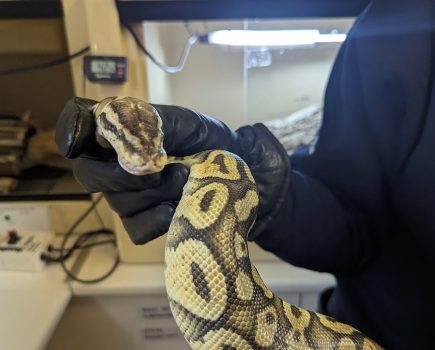MAR 6, 2013: Rats can create havoc for henkeepers. To deal with them, you have to understand how they behave. Laurence Beeken explains
Rats can create havoc for henkeepers. To deal with them, you have to understand how they behave. Laurence Beeken explains Second only to foxes, rats are the archetypal enemy of poultry keepers, and are classed as vermin, along with mice, crows, rabbits etc. Contrary to popular belief, it’s not the chickens that attract the mice, rather it is the feed and housing that they are drawn to, and bad feed storage and feeding practice will quickly lead to a bad rat or mouse problem. So what problems do they cause? Rats (and mice) will climb walls with ease and will happily chew through housing and feed bags, making them a costly pest to eliminate. They’ll also spread disease, including some transmissible to us, so hygiene and cleanliness are important. One of the most serious of these is Weil’s disease, so if you think you have a rat problem, wash your hands after touching any surfaces where their saliva, urine or droppings may have been left. Treat any cuts and/or grazes straight away and keep them covered. Rats have also been known to attack and kill young birds and chicks, so keeping them out of the coop is a necessity! How will you know if you have rats? Not as silly as it sounds, as initial rat incursions will often go unnoticed as they are nocturnal, so you’re unlikely to see them in the day (unlikely, but not impossible). Watch out for: • Chewed wood or wire • Droppings (little torpedoes the size of jelly beans) • Dirty smears along the base of walls (the grease and dirt from their bodies) • Paw prints in dusty areas • Feed scattered in areas where it shouldn’t be • Feed going missing overnight How to deter rats Definitely better than trying to deal with them when the invasion starts, prevention is your first step to combating the problem. Firstly, look at cleanliness, it not only keeps vermin at bay, but makes it more pleasant for you. Keep all feed contained in vermin proof bins (the thick plastic or metal types) and keep it located, if you can, in a shed away from the main chicken area. Don’t leave feed lying around, so either place it in a closed dispenser type feeder or remove it if uneaten. Definitely don’t leave hoppers filled overnight. Keep feeders outside, so keeping feed out of the coop, and don’t feed kitchen scraps – it’s against the law and is a sure-fire way to encourage rats. Collect eggs daily and don’t leave them overnight. Get rid of garden rubbish outside of the chicken area – it provides a safe place for the rats during the day. If you can, raise the coop off of the ground by at least 6 ins to make sure rats can’t make a home under it and move the house regularly. If you’re a fan of natural, organic methods, try planting mint – rats dislike the smell. Reducing rat damageDamage can be quite costly, but prompt action will minimise it and often prevent worsening or new damage. • Chewed wood can be coated with ‘cribbox’ a product sold to stop horses chewing the wood in their stables – it seems to stop further rat damage. • Use heavy gauge weld mesh rather than chicken wire for fences and enclosures. • Check housing and runs daily. • Chewed feed bags should be decanted immediately into rat proof bins. Dealing with rats If you find that despite your best efforts, the rats are determined to invade your chicken are, then you really have little option than to get rid of them in a permanent manner (humane destruction) A good outdoor cat (Siamese crosses are said to the best) will help keep the population down while a trained dog will track down and destroy a nest of rats. Often this is all that you’ll need when combined with good husbandry, however, if you have a serious problem, you may well consider traps or poisons, both of which are effective. (NB, if you have a dog, make sure it cannot get access to the runs as many will become indiscriminate in their killing once they start and you will lose the very thing you are trying to protect). Traps These can be of the ‘jaws’ type, which are designed to snap shut and kill the animal outright, or live traps which shut and imprison the rat. Both need a little skill in use to be effective, as they should be installed in a rat run for best effect – rats will use the same runs time and time again, making it easy to catch them. If you find that a rat is still alive in the trap, a strong swift blow across the nose or a pellet from an air rifle should kill them instantly, and remember to wear gloves to protect from disease. Poisons These are an alternative option if you have a large population, or if the animals have become wary of traps. Remember though that poisons are indiscriminate in their effects as they will kill most things which eat them and may remain in the dead body, poisoning anything which eats it. A simple bait box or tunnel is a good choice of dispenser as other animals and children cannot get to the poison, and you will just need to remember to change brand every month or so in order to prevent resistance to a particular chemical. Never leave poisons in open dishes and always observe the manufacturer’s instructions. Pest Control Services You can also contact your local council to obtain the services of the pest control officer. He will visit and examine the site and then put down poison in protected areas. So remember, rats are all around, but chickens don’t cause a rat problem, poor husbandry does. Always try to prevent and act swiftly when a problem is noticed. Enjoy your rat free chickens! *Laurence Beeken is an authority on henkeeping and author of The Haynes Chicken Manual.







